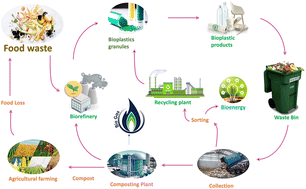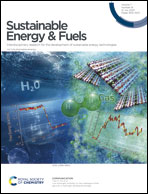Review on food waste valorisation for bioplastic production towards a circular economy: sustainable approaches and biodegradability assessment
Abstract
To implement circular production and consumption practices, tackling key societal concerns such as resource depletion, climate change, and environmental pollution is necessary. It urges the development of biowaste refineries as an alternative to fossil fuel-based refineries, which are gaining popularity globally. Numerous attempts are being made to encourage circular bio-economical approaches to consider food waste and leftover discharge transformation into value-added products. The valorisation of food waste has attracted substantial interest from both basic and applied domains due to its affordability and adaptability. The current review thoroughly describes the potency of converting food waste to create recyclable bioplastics. The rapid growth in the disposal of single-use plastics made from fossil fuels has created tonnes of plastic disposed of by humans and exacerbated the ecological imbalance. Hence, sustainability is achieved through the expansion of alternative bioplastic production. Various technologies that have been used to extract bioplastic from food waste are elaborated. In addition, a brief discussion on the factors affecting bioplastic generation along with its biodegradability and recyclability is provided. The economic viability, challenges and future scope for the production of bioplastics towards a sustainable bio-future are discussed in detail.

- This article is part of the themed collection: Biorefining


 Please wait while we load your content...
Please wait while we load your content...